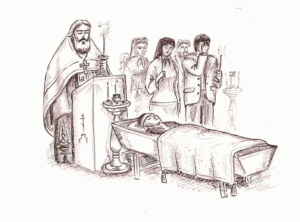17 November OS 2017: Thursday of the Ninth Week of St. Luke; St. Gregory of Neo-Caesaria, the Wonderworker
The daily Gospel reading for the Divine Liturgy this morning is Luke 16: 1-9.
The Lord said this parable: There was a certain rich man, which had a steward; and the same was accused unto him that he had wasted his goods. And he called him, and said unto him, How is it that I hear this of thee? give an account of thy stewardship; for thou mayest be no longer steward. Then the steward said within himself, What shall I do? for my lord taketh away from me the stewardship: I cannot dig; to beg I am ashamed. I am resolved what to do, that, when I am put out of the stewardship, they may receive me into their houses. So he called every one of his lord’s debtors unto him, and said unto the first, How much owest thou unto my lord? And he said, An hundred measures of oil. And he said unto him, Take thy bill, and sit down quickly, and write fifty. Then said he to another, And how much owest thou? And he said, An hundred measures of wheat. And he said unto him, Take thy bill, and write fourscore. And the lord commended the unjust steward, because he had done wisely: for the children of this world are in their generation wiser than the children of light. And I say unto you, Make to yourselves friends of the mammon of unrighteousness; that, when ye fail, they may receive you into everlasting habitations.
The Lord Jesus Christ is not, of course, recommending that we cheat our employers. The master in the parable has been cheated, but he shows himself bighearted and demonstrates a sense of humor: he commends the steward for his cleverness though not his dishonesty. The steward realized that he was facing disaster, and he took practical steps to deal with it.
The steward’s approaching dismissal symbolizes the hour of death, and the Lord commands us to “make friends” by means of “the mammon of unrighteousness” to prepare for death. He commands us in particular to give alms and in general to steward wisely the good things He gives us, using them for His glory and for our neighbor, so that by wise use of material things, we will inherit heavenly things. We may have misused the gifts our Master has given us, but we have time yet before death to use them for His glory and obtain His reward. How much time? We know not, and therefore we must begin today.
In commenting on this parable, St. Theophan the Recluse remarks on man’s reluctance to face and prepare for death:
…Death could overtake us at any moment, and then: Give an account of thy stewardship (Luke 16:2). Everyone knows this, but almost no one budges. What is this blindness? No one thinks he will die right now, but all suppose that they will live another day or two. They do not know the time, but are certain that death will come sometime later…No one intends to remain careless his entire life; he simply puts off changing for the present day. But since one’s entire life is composed of present days and hours, he does not take the trouble to put things in order for the future. – Thoughts for Each Day of the Year, p. 258
“…one’s entire life is composed of present days and hours.” The Lord’s command to live in the present and take no thought for the morrow (Matthew 6:34) does not contradict his command to remember death: the two commands are two sides of the same coin. The Lord wants us to think constantly on what is actual, to occupy the mind with reality not delusion. He wants us constantly to think about the events of today and the hour of death, and to take action based on this certain knowledge, for only these events are certain to take place. The rest, the imaginary “in-between” now and death, is the demons’ mental playground. There may be no in-between.
How can we return to this fundamental Christian activity, the remembrance of death, that overriding thought that so occupied our Christian forbears and yet does not make an impression on contemporary man, does not seem to enter his practical calculations?
We can begin, as Orthodox Christians should always do, with prayer, and specifically prayer for the reposed and night prayers directed to the remembrance of death. By more frequent prayers for the faithful departed, both in Church and at home, we both fulfill the commandment to love our neighbor and we remind ourselves that we need to prepare for death. By reading the Compline and/or the Night Prayers with attention, we are reminded at least daily, once every night, that sleep is an image of death, and our rising every morning an image of the resurrection.
We should take advantage of illness to glorify the Lord Who allows us to fall sick, that we may recall our mortality, weep over our sins, admit our total dependence on Him for our very existence, and resolve to live in repentance.
We should read pious accounts regarding the death of just and unjust men, the reality of their spiritual agony at that hour, the activity of angels and demons, and the particular judgment of the soul by Christ.
Truly, as the Holy Fathers say, he that remembers death will not sin.

